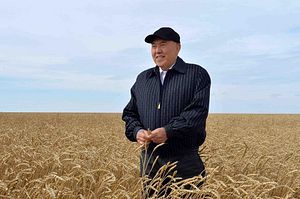Even a seasoned politician can misspeak, and Kassym-Zhomart Tokayev, president of Kazakhstan’s Senate, is no exception. But what slipped through Tokayev’s mouth recently could have deep implications. During an interview with BBC’s HARDtalk host Stephen Sackur, Tokayev said he personally believes that President Nursultan Nazarbayev will not run again in 2020, when his current term expires.
The interview, and specifically the portion about succession, sparked a heated debate throughout Kazakhstan where the issue of succession has been a hot topic for almost two decades already. What seemed to be a soft-ball general question about succession triggered a candid answer.
“Speaking frankly, I don’t believe that President Nazarbayev will go to the presidential election in 2020,” Tokayev said. “Because he is a very wise man and absolutely reasonable. I think that in 2020 we shall have presidential elections with other candidates, except President Nazarbayev.”
While he also assured the host that “it’s up to him to ultimately decide,” and that he “will exercise tremendous influence over politics” even if he does not become president again, Tokayev for the first time clearly admitted that 2020 could be the end of the road for Nazarbayev’s three-decade-long presidency.
Nazarbayev will mark his 78th birthday on July 6.
Tokayev’s words were soon played down by Dauren Abayev, minister of information and communication, who told the press that the decision is far from made.
“There’s still time until 2020,” Abayev said. “As someone who has worked closely with the president [as presidential press secretary], I am sure that Kazakhstan will only benefit from him running again in 2020.”
After the interview aired, Tokayev downplayed his own words.
“There is no need to fuel a drama about what I said [which was much more than that single excerpt]. HARDtalk interviews are tough, but I thought it was necessary to talk to them to describe what we are doing in our country,” he told the press.
Before his election in 2015, Nazarbayev said he had “different plans” for his future, but decided to run one last time. Since 2015, he has pledged multiple times to give more powers to the parliament. A potential devolution of responsibilities and government powers could potentially open up Kazakhstan’s political scene for competition and alternatives.
With the recent appointment of Nazarbayev as lifelong chairman of Kazakhstan’s Security Council, the country’s first and only president could be inching towards taking up a supervisory role in the local political environment. With a stronger parliament, Kazakhstan could get closer to a Spain or UK-style monarchy, with Nazarbayev becoming the wise king overseeing his country’s path forward.
The road to succession, however, seems to be far in the future. As Luca Anceschi and Bruce Pannier argued in a 2016 article, even by giving up the post of president, Nazarbayev would retain immense power in Kazakhstan. Chiefly because of the existing legislation protecting him – and his family – from prosecution because of his role of “Leader of the Nation,” which was enshrined in 2010.
“Nazarbayev would still, in fact, be leading the country even after his resignation,” they wrote for RFE/RL.
The larger-than-life presence of Nazarbayev and his family will continue looming over Kazakhstan, whether or not he continues as a president after 2020. That is, of course, unless those who come after him dramatically change the rules of the game and overthrow the system he has carefully crafted in the past three decades.
However, the most popular opposition forces have proved to be quite unpopular so far. Personal spats against the president only gain short-lived support, unless they are backed by alternative political proposals.
Tokayev could be right in both his statements: Nazarbayev will ultimately choose whether to run for president again, and he may very well not do so in 2020. But the fact that he had to clarify his own words after the interview aired and that he mentioned that HARDtalk formats are tough arenas betrays a lack of confidence in talking to free media outlets. If politicians could meet with independent media in their everyday life in Kazakhstan, they would be more accustomed to saying, and hearing, controversial and thought-provoking questions and answers.

































